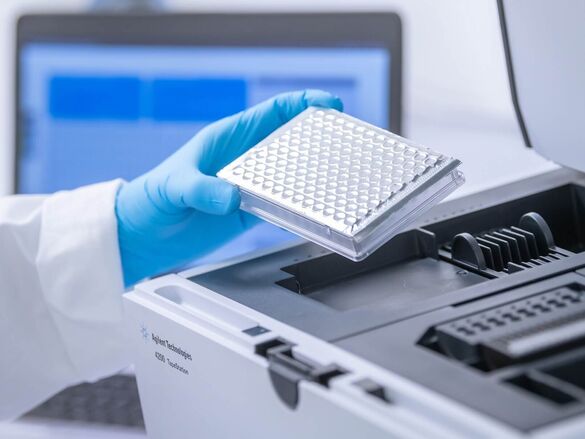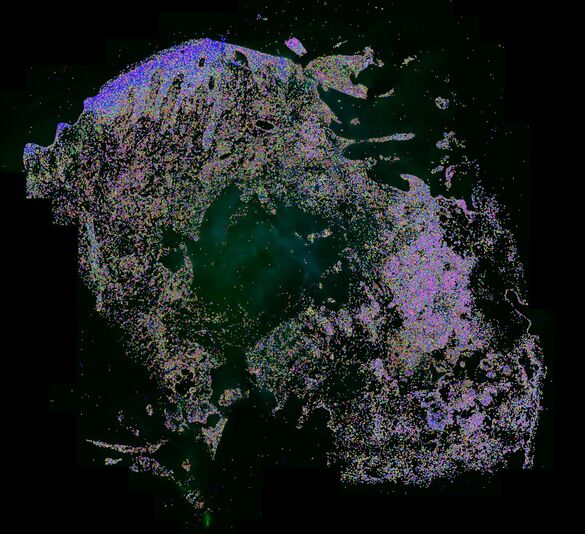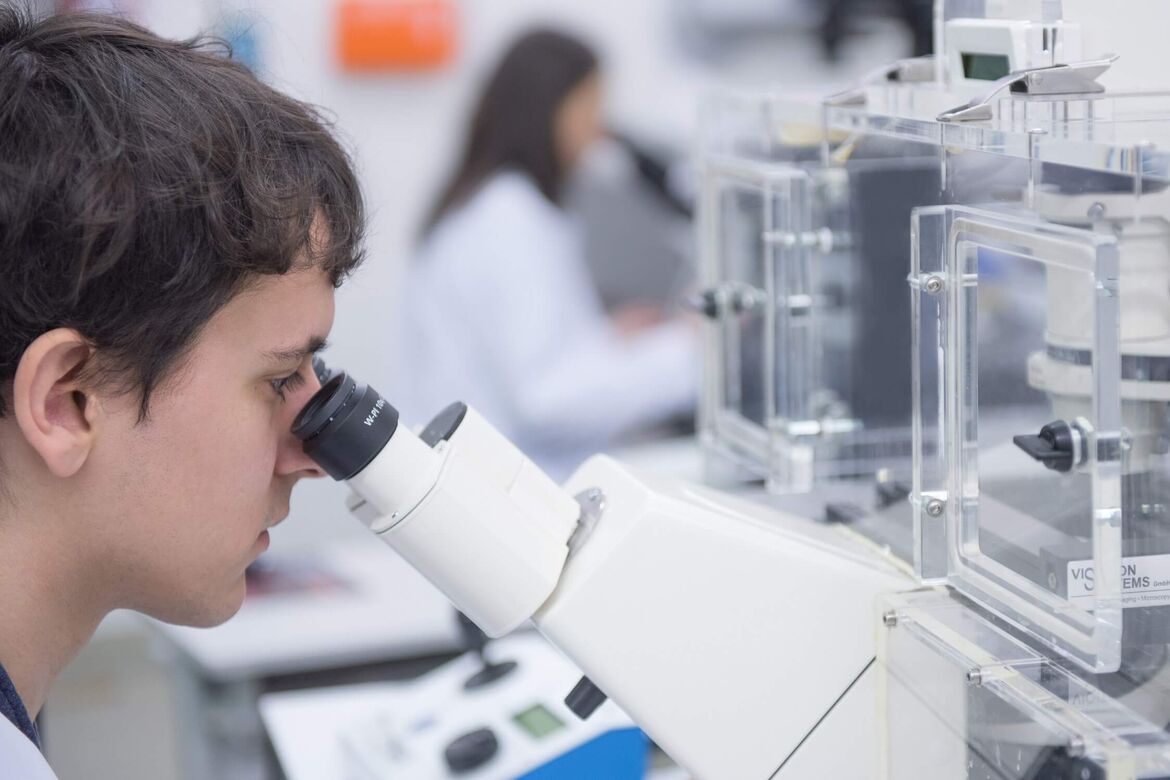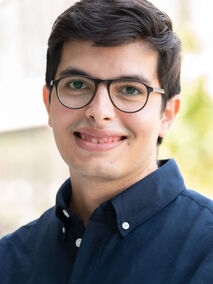Max-Eder Junior Research Group - AG Reschke
Targeting microbiome-induced T cells as therapeutic strategy for skin cancer
Previous and current research
Immunotherapy has revolutionized the treatment of cancer. Checkpoint blocking antibodies have been Food and Drug Administration (FDA)-approved for a multitude of cancer types, unresectable or metastatic cutaneous squamous cell carcinoma (cSCC) among these. However, a majority of patients do not benefit from immunotherapy and they succumb to metastatic cancer.

Recently, tissue resident memory T (TRM) cells have been implicated in a variety of solid tumors as prognostically beneficial for immunotherapy. In the context of immune-related adverse events we have shown that TRM cells exhibit strong expression of inhibitory checkpoint molecules, such as PD-1, CTLA-4 and LAG-3, leading us to propose that they expand during immunotherapy. TRM cells can produce IFN-γ which induces production CXCL9/10/11 by surrounding cells such as myeloid cells. These chemokines can recruit additional tumor infiltrating effector T cells (TILs) from the blood stream by binding to the CXCR3 receptor on the surface of T cells.
A potential reason for accumulation of TRM in the skin in the first place could be exposure to microbial peptides that serve as antigens. The present project aims to decode the link between cutaneous microbiome and TRM formation. Clinical response data from patients receiving immunotherapy will be linked to multi-omics data from patient specimen. Addressing these questions, we will use cutting-edge spatial technologies (see figure below) on samples from cSCCs and other skin cancers.
The overall goal is to identify mechanism-based biomarkers or novel target molecules that expand efficacy of immunotherapy to non-response patients across solid tumors.

Group Leader
PD Dr. med. Robin Niklas Reschke
Haut- und Lymphknotensonographie (DEGUM)
Schwerpunkt
Dermato-Onkologie, Tumorimmunologie

Team
Recruiting MD and PhD students eager to work in a lab that tries to understand and improve immunotherapy across cancers! Interested in working at the intersection of dermatology, oncology, immunology and microbiology?
Key Publucations
| Reschke R, Sullivan RJ, Lipson EJ, Enk AH, Gajewski TF, Hassel JC. Targeting molecular pathways to control immune checkpoint inhibitor toxicities. Trends Immunol. 2025 Jan;46(1):61-73. https://doi.org/10.1016/j.it.2024.11.014 |
| Reschke R, Richter J, Enk AH, Hassel JC. Use of Anti-PD1 Blockade After Hedgehog Inhibitors or as First-Line Therapy for Gorlin Syndrome. JAMA Dermatol. November 06, 2024. https://doi.org/10.1001/jamadermatol.2024.4445 |
| Mousa AM, Enk AH, Hassel JC, Reschke R. Immune Checkpoints and Cellular Landscape of the Tumor Microenvironment in Non-Melanoma Skin Cancer (NMSC). Cells. 2024; 13(19):1615. https://doi.org/10.3390/cells13191615 |
| Reschke R, Deitert B, Enk AH, Hassel JC. The role of tissue-resident memory T cells as mediators for response and toxicity in immunotherapy-treated melanoma-two sides of the same coin? Front Immunol. 2024 Mar 18;15:1385781. https://doi.org/10.3389/fimmu.2024.1385781 |
| Reschke R, Shapiro JW, Yu J, Rouhani SJ, Olson DJ, Zha Y, et al. Checkpoint blockade–induced dermatitis and colitis are dominated by tissue resident memory T cells and Th1/Tc1 cytokines. Cancer Immunology Research 2022:CIR-22-0362. https://doi.org/10.1158/2326-6066.CIR-22-0362 |
| Reschke R, Gajewski TF. CXCL9 and CXCL10 bring the heat to tumors. Science Immunology 2022;7:eabq6509. https://doi.org/10.1126/sciimmunol.abq6509 |
| Reschke R, Olson DJ. Leveraging STING, Batf3 Dendritic Cells, CXCR3 Ligands, and Other Components Related to Innate Immunity to Induce A "Hot" Tumor Microenvironment That Is Responsive to Immunotherapy. Cancers (Basel). 2022 May 16;14(10):2458. https://doi.org/10.3390/cancers14102458 |
| Reschke R, Yu J, Flood BA, Higgs EF, Hatogai K, Gajewski TF. Immune cell and tumor cell-derived CXCL10 is indicative of immunotherapy response in metastatic melanoma. J Immunother Cancer 2021;9:e003521. https://doi.org/10.1136/jitc-2021-003521 |
| Reschke R, Gussek P, Boldt A, Sack U, Köhl U, Lordick F, Gora T, Kreuz M, Reiche K, Simon JC, Ziemer M, Kunz M. Distinct Immune Signatures Indicative of Treatment Response and Immune-Related Adverse Events in Melanoma Patients under Immune Checkpoint Inhibitor Therapy. Int J Mol Sci. 2021 Jul 27;22(15):8017. https://doi.org/10.3390/ijms22158017 |
| Reschke R, Gussek P, Ziemer M. Identifying High-Risk Tumors within AJCC Stage IB-III Melanomas Using a Seven-Marker Immunohistochemical Signature. Cancers (Basel). 2021 Jun 10;13(12):2902. https://doi.org/10.3390/cancers13122902 |
Press
- TRYTRAC-Workshop in Stockholm: Führungskräfte für die Krebsforschung von morgen (Newsroom NCT Heidelberg)
- TRYTRAC Program – Advanced Training Series (cancercoreeurope.eu)
- Highlights from the CCE TRYTRAC Advanced Workshop at Karolinska Institutet (cancercoreeurope.eu)
- Targeting Molecular Pathways to Control ICI Toxicities - (oncodaily.com)
- Use of Anti-PD1 Blockade After Hedgehog Inhibitors or as First-Line Therapy for Gorlin Syndrome (oncodaily.com)
- Hautflora als Schlüssel in der Krebstherapie? (Newsroom UKHD)
- CXCL10: a promising marker for immunotherapy response in metastatic melanoma (uchicagomedicine.org)
- Almirall Förderpreis Dermatologie 2023 verliehen - mdm MedienDiensteMedizin Verlagsgesellschaft mbH (mdmverlag.com)
Max-Eder group members

PD Dr. med. Robin Niklas Reschke
Arbeitsgruppenleiter
(Hauttumorzentrum Heidelberg)
Haut- und Lymphknotensonographie (DEGUM)












